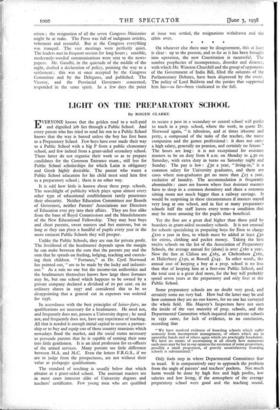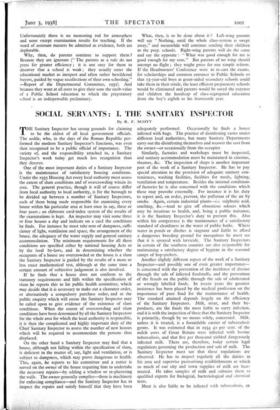LIGHT ON THE PREPARATORY SCHOOL
By ROGER CLARKE
EVERYONE knows that the golden road to a well-paid and dignified job lies through a Public School. And every parent who has tried to send his son to a Public School knows that the way is barred unless the boy has first been to a Preparatory School. Few boys have ever made their way to a Public School with a big P from a public elementary school, and few indeed from a grant-aided secondary school. These latter do not organise their work so as to prepare candidates for the Common Entrance exam., still less for Public School scholarships for which Latin is obligatory and Greek highly desirable. The parent who wants a Public School education for his child must send him first to a preparatory school ; there is no other way.
It is odd how little is known about these prep. schools. The searchlight of publicity which plays, upon almost every other type of educational establishment rarely penetrates their obscurity. Neither Education Committees nor Boards of Governors, neither Parents' Associations nor Directors of Education ever pry into their affairs. They are free alike from the bane of Royal Commissions and the blandishments of the New Educational Fellowship. They may. beat boys and cheat parents, sweat masters and fret matrons, but so long as they can place a handful of pupils every year in the more eminent Public Schools they will prosper.
Unlike the Public Schools, they are run for private profit. The livelihood of the headmaster depends upon the margin he can make between the sum that the parents pay and the sum that he spends on feeding, lodging, teaching and exercis- ing their children. " Fortunes," as Dr. Cyril Norwood has pointed out, " are to be made by the lucky and industri- ous." As a rule no one but the income-tax authorities and the headmasters themselves knows how large these fortunes may be, but one school which happens to be owned by a private company declared a dividend of zo per cent. on its ordinary shares in 1937 and considered this to be so disappointing that a general cut in expenses was ordered for 1938.
In accordance with the best principles of laisser-faire, no qualifications are necessary for a headmaster. He need not, and frequently does not, possess a University degree; he need not, and frequently does not, have any experience of teaching. All that is needed is enough initial capital to secure a partner- ship or to buy and equip one of those country mansions which nowadays flood the market, and the social status necessary to persuade parents that he is capable of turning their sons into little gentlemen. It is an ideal profession for ex-officers of the armed services. Many parents see little difference between M.A. and M.C. Even the letters F.R.G.S., if we are to judge from the prospectuses, are not without their value as pedagogic qualifications.
The standard of teaching is usually below that which obtains at a grant-aided school. The assistant masters are in most cases innocent alike of University degrees and teachers' certificates. Few young men who are qualified to secure a post in a secondary or central school will prefer to teach in a prep. school, where the work, to quote Dr. Norwood again, " is laborious, and at times irksome and petty, a compound of the tasks of the teacher, the nurse companion and the games professional : it does not carry a high salary, generally no pension, and certainly no future." The hours are long : it is not exceptional for assistant masters to be on duty from 8 a.m. on Monday to 4.3o on Saturday, with extra duty in turns on Saturday night and Sunday. The pay is low : £So a year, "living-in," is a common salary for University graduates, and there are cases where non-graduates get no more than £25 a year, exclusive of laundry. The accommodation is frequently abominable : cases are known where four dssistant masters have to sleep in a common dormitory and share a common sitting room not much bigger than a railway carriage. It would be surprising in these circumstances if masters stayed very long at one school, and in fact at many preparatory schools half the staff leaves every term—a condition that may be more amusing for the pupils than beneficial.
Yet the fees are a great deal higher than those paid by boarders in grant-aided secondary schools. It is not unusual for schools specialising in preparing boys for Eton to charge £2I0 a year in fees, to which must be added at least £30 for extras, clothing and pocket money. Taking the first twelve schools on the list of the Association of Preparatory Schools, the average annual fee (alone) is over Z16o a year. Now the fees at Clifton are £165, at Cheltenham £162, at Haileybury £150, at Rossall £145. In other words, the annual cost of keeping a boy at a prep. school is no less than that of keeping him at a first-rate Public School, and the total cost is a great deal more, for the boy will probably spend seven years at the preparatory and only four at the Public School.
Some preparatory schools are no doubt very good, and certainly some are very bad. How bad the latter may be and how common they are no one knows, for no one has surveyed the whole field. His Majesty's Inspectors have not seen the, inside of the vast majority of prep. schools, and the. Departmental Committee which inquired into private schools in 1931 came, for lack of evidence, to no conclusion, recording that
" We have received evidence of boarding schools which suffer seriously from incompetent management, of others which are in unworthy hands and of others again which are practiqslly fraudulent_ Wehave no means of ascertaining at all closely how numerous such cases may be but in our opinion the existence of some proportion, possibly a small proportion, of gravely unsatisfactory boarding schools is substantiated."
Only fools step in where Departmental Committees fear to tread. It is comparatively easy to approach the problem from the angle of parents' and teachers' pockets. Not much harm would be done by high fees and high profits, low salaries and low living, if the atmosphere of the average preparatory school were good and the teaching sound, Unfortunately there is no measuring rod for atmosphere and none except examination results for teaching. If the word of assistant masters be admitted as evidence, both are deplorable.
Why, then, do parents continue to support them ? Because they are ignorant (" The parents as a rule do not press for greater efficiency ; it is not easy for them to discover that a school is weak ; they usually enter the educational market as inexpert and often rather bewildered buyers, guided by vague recollections of their own schooling." —Report of the Departmental Committee, 1932). And because they want at all costs to give their sons the snob-value of a Public School education to which the preparatory school is an indispensable preliminary. What, then, is to be done about it ? Left-wing parents will say " Nothing, until the whole class-system is swept away," and meanwhile will continue sending their children to the prep. schools. Right-wing parents will do the same and say the opposite : " What was good enough for me is good enough for my sons." But parents of no wing should attempt no flight ; they might press for one simple reform. If the Headmasters' Conference were to re-cast the exams. for scholarships and common entrance to Public Schools so that 13-year-old boys at grant-aided secondary schools could take them in their stride, the least efficient preparatory schools would be eliminated and parents would be saved the expense and children the handicap of class-segregated education from the boy's eighth to his fourteenth year.



















































 Previous page
Previous page